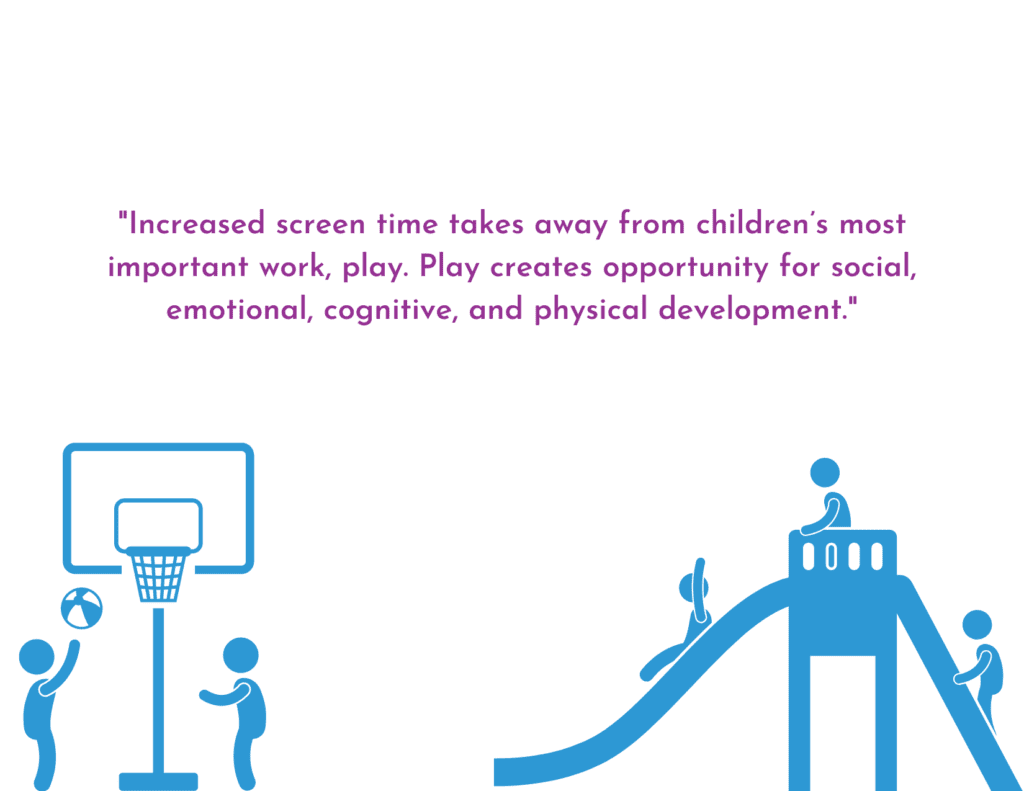Technology is part of our everyday life. We are more connected than ever and depend on it for communication, education, work, and entertainment. But is all that technology a good thing? Overuse of technology, specifically increases in screen time, has led to higher rates of obesity, challenges paying attention, increases in mental health concerns such as social anxiety and depression, and can critically impact sleep. Recommendations from the American Academy of Pediatrics include limiting screen times, vigorous activity or exercise for at least 60 minutes a day, and getting adequate sleep for healthy childhood development.
Increased screen time takes away from children’s most important work, play. Play creates opportunity for social, emotional, cognitive, and physical development. It is how children explore the world and learn problem solving, critical thinking, and negotiate and follow rules. It also builds confidence and resilience through social development and skill mastery. Play in early childhood provides the foundation for the skills needed to be a successful adult.

Concern regarding too much screen time is not new. It has been a debated topic with the widespread access to TV, computers, and video game consoles in the home. More recently, use of technology has skyrocketed with handheld devices such as phones and tablets. Too much screen time has been linked to:
· Being overweight from inactivity
· Impaired or delayed language and communication skills
· Inability to fall or stay asleep
· Difficulty paying attention and multi-tasking
· Trouble critical thinking, decision making, and solving multi-step problems
· Poor prioritizing
· Inability to regulate emotions and impulses
Reports of daily use for non-work or education purposes ranged from 1-3 hours pre-pandemic to 2-6 hours daily post-pandemic. While too much screen time can affect anyone, it is critical to monitor screen time and appropriate screen content in developing brains.
Eighty-five percent of parents allowed young children aged 0-3 years to use technology before the pandemic compared to almost all parents post pandemic. As screen time for young children increases so do rates of attention-deficit/hyperactivity disorder, and mental health concerns such as social anxiety and depression in later childhood.
The American Academy of Pediatrics has recommendations to lessen negative outcomes associated with too much screen time. See the chart below for age specific recommendations for screen time and sleep.
|
Age |
Screen Time |
Amount of Sleep |
|
Birth- 2 years |
No amount of screen time is recommended |
14-17 hours. including naps |
|
2-5 years |
Less than 2 hours of screen time (includes education and entertainment) |
10-13 hours, including naps |
|
5-12 years |
Less than 2 hours of screen time outside of educational opportunities |
9-12 hours |
|
12-18 years |
Less than 2 hours of screen time outside of educational opportunities |
8-10 hours |
In addition to limiting screen time, it is important to help young children develop responsible technology habits. Parents and adults should model habits such as turning off the TV and putting away devices during mealtimes and turning off technology an hour before bedtime. There is also a responsibility to teach digital safety, for example not sharing personal information or downloading suspicious apps, using secure websites, and not meeting people online. Watching or engaging in technology with children can help monitor and provide feedback in real time for safe use.
Alternatives to screen time include, you guessed it, play! Build with Legos or blocks, build a fort, sculpt with play-dough, play a game, play cards, do a puzzle, read together. And get active! Go for a walk, collect leaves, garden, check out a local park, build and complete an obstacle course. The ideas are endless.







